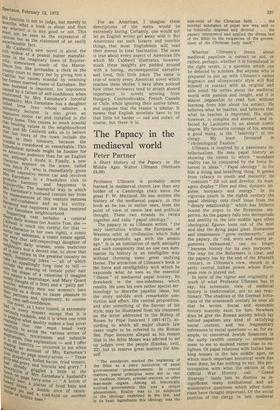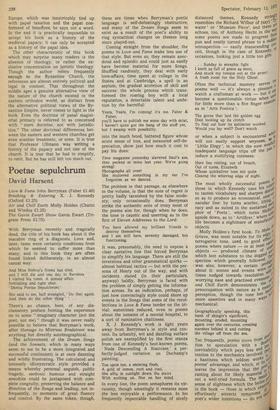The Papacy in the mediaeval world
Peter Partner
A Short History of the Papacy in the Middle Ages Walter Ullmann (Methuen £4.50) Professor Ullmann is probably more learned in mediaeval church law than any holder of a Cambridge chair since the great F. W. Maitland. He has written the history of the mediaeval papacy, in this book as he has in earlier ones, from the point of view of canon law and political thought. These two strands he twists together and calls "papal ideology." The papacy is. as Ullmann writes, "the only institution within the European or Western orbit of civilisation which links the post-apostolic age with the atomic age." It is an institution of such antiquity and such complexity that no one can summarise its history in an intelligible way without choosing some great unifying theme. The attraction of Ullmann's book is the force and intelligibility with which he expounds what he sees as the essential " theme " of mediaeval papal history. Its drawback is the one-sidedness which results. He uses his own rather special terminology to describe papalist ideas, but the story unfolds with remarkable conviction and effect. His central proposition, and also something of the flavour of his style, may be illustrated from his comment on the letter addressed to the Bishop of Rouen by Pope Innocent I (401-417), according to which all major church law cases ought to be referred to the Roman See. Pope Innocent alleged as his reason that in the Bible Moses was advised to set up judges over the people (Exodus, xviii, 22), but to reserve great matters for himself.
"The standpoint marked the beginning of the Bible as a piece justicative of papal governmental pronouncements. In crucial matters, papal principles were not to rest on tradition, history, synodal statutes, or other man-made organs. Among all historically evolved governments this was a unique phenomenon. Reality was to be subjected to the ideology enshrined in the law, and in its basic ingredients this ideology was the sum-total of the Christian faith . . . the internal substance of papal law was said to be biblically inspired and derived . . . the papacy interpreted and applied the divine law of the Bible to the exigencies of the government of the Christian body itself."
Whether Ullmann's thesis about medieval papalism is correct or not, or rather, perhaps, whether it is formulated in the right terms, is a question which can be debated by scholars. But anyone who is prepared to put up with Ullmann's rather dogmatic and idiosyncratic style will find himself in contact with an original and able mind. He writes about the medieval world with passion and insight, and it is almost impossible to read him without learning from him about his subject. He believes what he teaches, and believes that what he teaches is important. His style, however, is complex and abstract, and infected by Latinisms to an almost comic degree. My favourite coinage of his, among a good many, is the " lascivity " of the clergy. My least favoured is " christological fixation." Ullmann is inspired by a passionate intellectualism. He sees papal history as showing the extent to which "mundane reality can be conquered by the force inherent in ideas." "Papal ideology is for him a living and breathing thing. It grows from infancy to youth and maturity; its " contours " fill out and develop; its managers display "fibre and élan, dynamic impulse, buoyancy and energy." In its vigorous youth in the eighth century the papal ideology cuts itself loose from the "dreary relationship" which has hitherto bound the popes to the Byzantine emperors. As the papacy falls into decrepitude and senility in the late middle ages other ideological figures loom out of the mist and slay the dying papal giant. Humanism and renaissance "grow exuberantly," and the papacy, its "old, worn and musty arguments exhausted," can no longer "harness history for its own purposes." The way for the Reformers is clear, and the papacy has by the end of the fifteenth century, in Ullmann's view, shrunk to a petty central Italian power whose European role is played out. In spite of the vigour and originality of much of what Professor Ullmann has to say, his schematic view of medieval history is traditionalist, not to say reactionary. The shadows of the German historians of the nineteenth century lie over all that he writes. Social and economic history scarcely exist for him. Nowhere does he give the Roman society which lay behind papalism any kind of satisfying social context, and his fragmentary references to social questions — as, for example, to converted Jewish financiers in the early twelfth century — sometimes seem to me to mislead rather than to enlighten. Of papal relations with Italian banking houses in the late middle ages, on which much important historical work has been done, he has nothing to say. His preoccupation with what the editors of the Official War History call "Grand Strategy " leads him to dismiss as insignificant many institutional and administrative questions which other historians have thought important. Of the social position of the clergy in late medieval Europe, which was inextricably tied up with papal taxation and the papal conferment of benefices, he says not a word. In the end it is practically impossible to accept his book as a history of the medieval papacy; it can only be accepted as a history of the papal idea.
The other characteristic of this book which may surprise many readers is the absence of theology, or rather the exclusive concentration on juristic theology. Though the author refers frequently enough to the Byzantine Church, the references are almost entirely political and legal in context. That throughout the middle ages a genuine alternative view of the nature of the church existed in the eastern orthodox world, as distinct from the alternative political views of the Byzantine Empire, never comes to light in the book. Even the doctrine of panal magisterial primacy is referred to as concerned with "mere doctrine, not with jurisdiction." The other doctrinal differences between the eastern and western churches get even scantier treatment, or none. It is true that Professor Ullmann was writing a history of the papacy and not one of the church. It is true that he had to simplify, to omit. But he has still left too much out.











































 Previous page
Previous page